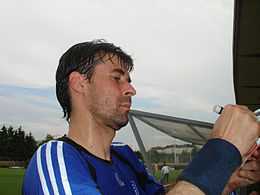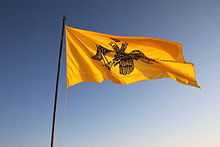A.E.K. (sports club)
| A.E.K. | |
|---|---|
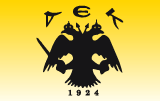 | |
| Full name | Athlitiki Enosis Konstantinoupoleos |
| Nicknames |
Vasilissa (The Queen) Enosis (Union) Dikefalos Aetos (Double-Headed Eagle) Kitrinomavri (Yellow-Black) |
| Founded | 1924 |
| Colours | Golden yellow, Black |
| Anthem | Empros tis Aek palikaria (Christos Kolokotronis, Stelios Kazantzidis) A.E.K. club anthem |
| Chairman | Alexandros Alexiou |
| Titles | European Titles: 2 (Basketball) |
| Website |
www |
| Departments of A.E.K. | ||
|---|---|---|
| |
|
|
| Football | Basketball | Volleyball |
| |
|
|
| Handball | Boxing | Futsal |
| |
|
|
| Fencing | Chess | Cycling |
| |
|
|
| Athletics | Table tennis | Club |
Athlitiki Enosis Konstantinoupoleos (Greek: Αθλητική Ένωσις Κωνσταντινουπόλεως, Athletic Union of Constantinople), commonly referred to as A.E.K. or in European competitions as A.E.K. Athens, is a Greek multi-sport club based in Athens. The club was founded in 1924 by Constantinopolitans who migrated to the Greek capital. It has the double-headed eagle as emblem and its colours are black and golden yellow, inspired by the Byzantine Empire.
History
The club was founded in 1924 in Athens by Greek refugees from Constantinople (now Istanbul) in the wake of the Greco-Turkish War and subsequent population exchange. The large Greek population of Constantinople, not unlike those of the other Ottoman urban centres, continued its athletic traditions in the form of numerous athletic clubs. Clubs such as Enosi Tataoulon (Ένωση Ταταούλων) from the Tatavla district, Megas Alexandros (Μέγας Αλέξανδρος) of Vathyriakos, and Hermes (Ερμής – Ermis) of Galata existed to promote Hellenic athletic and cultural ideals; Hermes, one of the more popular clubs, was formed in 1875 by the Greek community of Pera (Galata). Forced by the Kemalist regime to change its name to Pera Club in 1921, many of its athletes fled during the population exchanges at the end of the Greco-Turkish War, and settled in Athens and Thessaloniki.
The founders of AEK established the club with the intention of providing athletic and cultural diversions for the thousands of predominantly Constantinopolitan and Anatolian refugees who had settled in the new suburbs of Athens (Nea Filadelfeia, Nea Ionia, Nea Chalkidona, Nea Smyrni, e.t.c.).
1924–1945
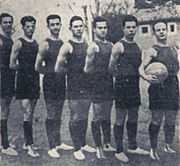
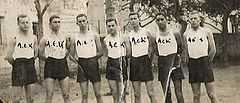
Established in Athens in 1924 by Greeks from Constantinople (now Istanbul), AEK has grown to become one of the most successful clubs in Greek football.
AEK formed its basketball team in 1924. AEK Athens Basketball is the most successful among A.E.K.'s athletic departments for the reason that AEK's basketball team was the first ever Greek team to win an international trophy in any team sports.
AEK Athletics club was established in 1924 and is one of the most successful departments of AEK.
One of the first sections of the AEK athletic club was cycling. M. Kaloudis was a winner in the Balkansgmaes (in 1940 in Bucharest when he was 3rd) and was one of the founders of the Chamber. He first appeared in 1929 and was followed by Petoun, Tarsinian and Krisalis. Another cycling ace was Kouvelis, who won the gold medal in the Balkan Games of 1940 in the race of 33 kilometers. Both Kaloudis and his Kouvelis participated in the Olympic Games in London in 1948.
1945–1960
The Olympic Games of 1948 in London, M. Kaloudis led to the new excursion of AEK In Cycling. At the beginning of the'50s, the sport had blossomed and AEK competed with Panionios and Panathinaikos. The department then had a plethora of skilled cyclists as Davouti, Kouyioumtzis (Athens won the race-Loutraki 1952), Chatziargyri, Georgiadis, Arapi, Barda, Alexis, Tzioti, Barla, Trasian.
AEK Table Tennis Club acquired the third position, both in men and also in young men championships in 1959. AEK Athens Table Tennis (Ping-Pong) Club, participated in Greek championships during the decades of 1950, 1960, 1970 and 1980.
1961–1970
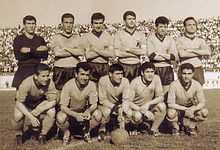
AEK Athens V.C. is the volleyball team of the Greek sports club AEK. It was founded in 1967 by Jason Platsi.Over the years AEK have struggled to stay in the top flight of Greek volleyball, competing in A2(Greece's second division) and A1. The Board of Boxing founded in 1969 by the Lampidi. From the 1970s, had the first success.
1971–1980
Football Team participated to the semi-final of UEFA Cup in 1977. With many of its star players, and continuously appearing in European (UEFA Champions League and UEFA Cup) competitions.
1981–1990
AEK Table Tennis Club acquired the third position in Greek Cups of 1984 and 1985. The relevant department of AEK was inactive for almost 23 years (1986–2009).
1991–2000
Since 1995, AEK Athens has also a women volley club team, which has been advanced to the Final of the Greek Cup (2011).
The Department of Fencing AEK Founded in 1996, relying on a trunk athletes beginning in the infrastructure of the club, little by little and gradually ascended the steps and assumed a leading role in the game, while our athletes manning the National Teams. Registrar of the Board throughout this time, and Constantine Beverage while coach since 1997 is Thanassis Tsamaldoupis. The sport of Fencing is separated into three events: Sabre, foil and épée.
The biggest success for the boxing department came in the from late 90's, with Tigran Ouzlian, Arthur Mikaelian, Mike Arnaoutis (who is now a professional boxer in the USA). Valerio Chartsislava lead the Society teammates at the National Championships.
2001–2010
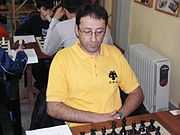
AEK Athens H.C. is also another growing department at AEK.The department Handball AEK founded by a decision of the General Assembly of AEK on July 12, 2005. On August 5, 2005, the Greek Handball Federation accepted a merger through absorption of the association's Board of handball GA Ilioupolis with section Handball Sports Union of Constantinople. In 2007 AEK HC was 3rd in A1 and gained the first participation in European Cups. On 31 May 2009, AEK HC won the Greek Cup in Serres.
The department of Futsal AEK, established in 2008 by a merger with "Enosi Geraka Futsal team" and participated in B'Ethniki (second division), where it finished 1st at the regular season and 2nd after play-off games. However, for the period 2009–10 AEK futsal club is playing again at B'Ethniki, due to a decision taken by E.P.O. (Greek Football Federation), forbitting all team mergers generally. AEK Futsal Club terminated at second position of B'Ethniki after play-off games of April 2010 and gained the participation at A'Ethniki (first division) for the period 2010–11 and has now been advanced to the semi-final of the Greek Cup (2011).
The Chess part of AEK was founded by a decision of the General Assembly of AEK on July 12, 2005. The department staffed directly by September 3, 2005 is a member of the Greek Chess Federation. In 2006 AEK Chess Club was Greek Cup Finalist and in 2008 Greek Cup Semi Finalist (3rd place). Also won the Attica Cup in 2006 and the Attica Rapid Championships in 2006, 2009 and 2010. In 2010 participated at A' Ethniki (1st Division) and took the 7th place.
AEK VC had its finest moment with coach Stelios Prosalika, as has prevailed in the final-4 of the European Cup Winners Cup. The races held (9–10 March 2000) in the closed Nea Liosia and AEK lost in the semi-final by Cuneo, but won 3–1 Galatasaray in the small final and won the 3rd place.
2011–2020
On 26 February 2011, AEK HC advanced to the quarter-final (best 8) of European Challenge Cup, by defeating Sporting Lisboa. On 7 May 2011, AEK HC won the Greek Championship, by defeating PAOK 22–23 in Thessaloniki.
Crest and Colours
Since the club's foundation, AEK have had three main crests, though all underwent minor variations. In 1924, AEK adopted as their first crest the image of a double-headed eagle (Δικέφαλος Αετός – Dikefalos Aetos), which remained for the next half-century, on a golden yellow background. When AEK was created by Greek refugees from Constantinople in the years following the Greco-Turkish War and subsequent population exchange, the emblem and colours were chosen as a reminder of lost homelands; they represent the club's historical ties to Constantinople. Its usage also survived as a decorative element in the Greek Orthodox Church, which was the inheritor of the Byzantine legacy during the Ottoman Empire, while it remained a popular symbol among Greeks. In modern Greece various variations of the two-headed eagles are used in Church flags (based on Byzantine flag patterns and heraldic emblems) and, officially, by the Greek Army; the bird found its way into the Greek coat of arms for a brief period in 1925–1926.[1]
Departments
The club fields teams in many sports, including athletics, cycling, boxing, chess, fencing and table tennis, but its most popular teams primarily compete in association football, basketball, volleyball, handball and futsal. AEK being an amateur all-round sports club with the mission to create and advance as many sports as is feasible, its main professional and semiprofessional teams operate independently albeit in affiliation with it.
Titles
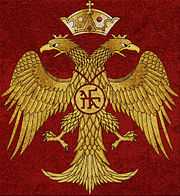
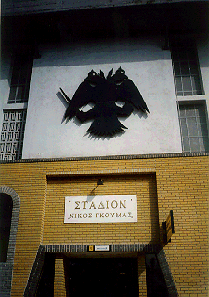
A.E.K. Football Club
- Greek Championships (11):
- 1939, 1940, 1963, 1968, 1971, 1978, 1979, 1989, 1992, 1993, 1994
- Athens FCA Championship (local level) (4):
- 1940, 1946, 1947, 1950
- Greek Cup (14):
- 1932, 1939, 1949, 1950, 1956, 1964, 1966, 1978, 1983, 1996, 1997, 2000, 2002, 2011
- Greek League Cup (1):
- 1990
- Greek Super Cup (2):
- 1971 (unofficial), 1989, 1996
A.E.K. Basketball Club
- Greek Championships (8):
- 1958, 1963, 1964, 1965, 1966, 1968, 1970, 2002
- Greek Basketball Cup (3):
- 1981, 2000, 2001
- Cup Winners' Cup/Saporta Cup (2):
- 1968, 2000
A.E.K. H.C.
- Greek Championship (2) :
- 2011, 2013
- Greek Cup (3) :
- 2009, 2013, 2014
A.E.K. V.C.
- Greek Men League Cup (1) :
- 2014
- Greek Women Championship (1) :
- 2012
- Greek Women Super Cup (1) :
- 2012
A.E.K. Cycling
- Greek Team Championships 10:
- 1960, 1961, 1962, 1964, 1965, 1966, 1968, 1975, 1979, 1981
- Πρωταθλήματα Δημόσιας Οδού Ανδρών12:
1960, 1961, 1964, 1966, 1968, 1974, 1975, 1976, 1977, 1979, 1981, 1994.
- Πρωταθλήματα Πίστας Ανδρών7:
1960, 1961, 1962, 1964, 1965, 1966, 1975
A.E.K. Boxing Club
- Greek Team Championship 6:
- 1978, 1980, 1995, 1999, 2000, 2006
A.E.K. Athletics
- Greek Cross-Country Championships (men) 11:
- 1929 ,1937, 1946, 1957, 1958, 1959, 1960, 1961, 1962, 1963, 1964
- Greek Cross-Country Championships (women) 3:
- 2010, 2011, 2012
- Greek athletics closed Championships (women) 1:
- 2011
- Greek athletics Championships (women) 4:
- 2011, 2012, 2013, 2014
A.E.K. Fencing
- Πανελλήνια Πρωταθλήματα Σπάθης (Γυναικών) 3:
2012, 2013, 2014.
Notable supporters
- Stelios Kazantzidis, singer
- Lambros Konstantaras, actor
- George Mitsikostas, comedian
- Lefteris Papadopoulos, lyricist
- Kostas Voutsas, actor
References
External links
| Wikimedia Commons has media related to AEK football. |
| Wikimedia Commons has media related to AEK basketball. |
- A.E.K. Sports Club Official Website
- A.E.K. Football Club
- A.E.K. Internet Fan Club
- A.E.K. history blog
- Original 21
- http://www.aekfutsal.com/
| ||||||||||||||||||||||||||||||||||||||||||
| ||||||||||||||||||||||||||
